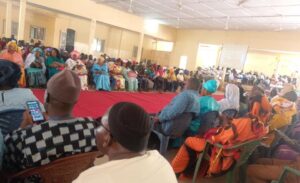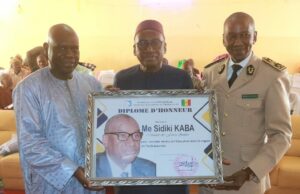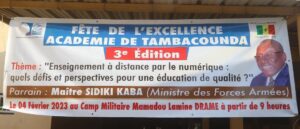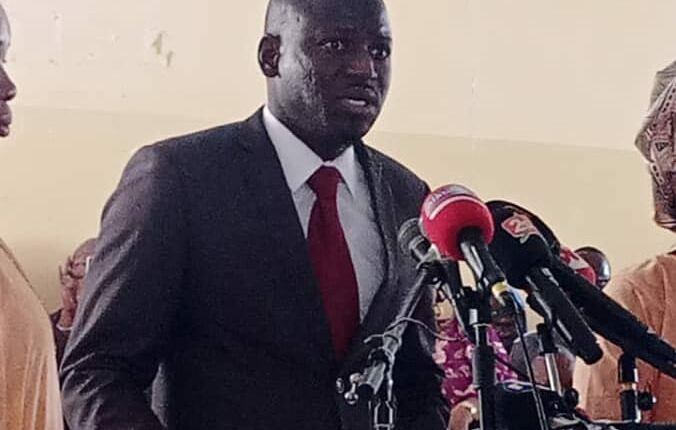Tambacounda/Education : Le Censeur Mamadou Ndiaye sur l’importance du Numérique dans les Enseignements-Apprentissages.
«Enseignement à distance par le numérique : quels défis et perspectives pour une éducation de qualité au Sénégal ?».
The “digital and distance education” binomial remains a means and an end which is supported in the political vision of the Head of State. The awareness, by our rulers, of the need to build a quality education system is set out in the Letter of General Policy (LPG) for the Education and Training sector of (2012) in these terms: “ An equitable, effective, efficient education and training system, in line with the requirements of economic and social development, more committed to taking care of the excluded, and based on inclusive governance, greater accountability of Local Authorities and actors at the base”. Effectiveness and efficiency, terms dear to the Head of State, cannot be put to use without the opportunities offered by digital technology. The efforts made in this area show that Senegal is resolutely committed to the digital path. In view of the current context, everything leads us to believe that digital is a tool that has served its purpose well. COVID19 is illustrative enough to discuss its effectiveness and the prospects that emerge from it. The recent health crisis reminded us of the place of digital technology in the educational and administrative system. The IT tool has been the main lever for the resilience of the education sector in the face of the pandemic. In Tambacounda, the academic authorities, it should be recalled, spared no effort to save the 2019-2020 school year to ensure students have a bright post-COVID-19 future. With the help of local media such as RTS3, courses were given to students in the exam class in the dominant classes in order to allow them to be in permanent contact with knowledge. The RTS3 program entitled « Thank you Professor« had seen the progress of courses in MATHS, SVT, ENGLISH and French. This managerial prowess, which deserves congratulations, leads us to reconsider the importance of computers and distance learning. At the end of the pandemic, several Western countries held digital assemblies, deeming it necessary to hold citizen consultations for continuous computerization of teaching/learning. It was necessary at their level, that the resilience of the school serves as an example of development. These foundations are above all inspired by the need to build, through the school, an enlightened citizenship for the proper use of digital technology. This is to say that the differences noted on social networks in Senegal challenge everyone as to the imperative of making responsible use of digital technology in the image of great nations. With a view to digitizing the education sector to be in line with digital requirements, the State of Senegal has deployed major resources. It has positioned itself as a major player by facilitating household access to basic social services and high-speed fiber optics, which contributes to the reduction, in the short term, of territorial imbalances and while offering an appropriate structural framework. to distance education. As it seems, digital is proving to be an alternative to the large crowds of face-to-face training. In other words, distance courses are a response to the lack of training infrastructure. Through E-LEARNING, teaching is provided without the need for a physical presence in class. Thanks to remote platforms, the Senegalese student is less and less confronted with the problem of housing and the financing of studies, because from his home the latter to access the training of his choice at a lower cost. The SENUM platform created during COVID by the Ministry of National Education made it possible to relocate school to home during confinement in order to guarantee educational continuity for each child. The Virtual University of Senegal is an example. This is why a thinker said: “Distance education is education without distance”. As a result, teaching operationalizes the centrality of the learner in that it creates the conditions for the empowerment of the student dear to the theoreticians of active pedagogy. Instead of expecting everything from his conductor to speak like Montaigne, he becomes more active than passive in the construction of his knowledge. It goes without saying that digital promotes inclusive learning and stimulates curiosity. Today, the student can consult the same sites as the teachers. The Matheux clan will not say the opposite. Through this mechanism, we are witnessing the liberalization and democratization of knowledge. Ladies and gentlemen, however, it must be admitted that our level of development does not allow wide coverage of digital tools throughout the territory. This incomplete network and the lack of appropriate means are not the result of a lack of will on the part of our rulers.
To further mark its anchoring in the digital school tool, teachers need capacity building more than any other. This would contribute to reducing paper-making pedagogy and avoiding the weak interaction generally caused by the fact that the learner is ahead of the Master. It will be necessary to find clever methods that motivate the student and engage him in an interactive process oriented towards acquisitions that are more practical than theoretical. For systemic consistency, it should be remembered that digital technology could well accommodate daaras. There are applications linked to Koranic teachings or in the Arabic language which, sufficiently exploited, could make teaching in the Daaras more modern. With the construction of modern Daaras, it is hoped that the State of Senegal will further open this area to the magic of digital technology. You are aware that some digital devices sound Arabic. Dear students, the digital revolution is an irreversible reality of modern times to which we must adapt. Its constant dynamism requires on your part continuous training and an ever-renewed appropriation of the tools that it makes available to you at each time. Thierno Soufiane DIALLO , a student from Tambacounda who created a motion detector to fight against thefts, monitor remotely, is a good example to be inspired by. Knowledge of digital technology should not be reduced to the manipulation of information media such as social networks, which are not only school distractors but also and above all social destroyers which undermine the living together which sets Senegal apart. I cannot end without mentioning the connection of the dynamics between ICT training and the challenges of employment. This is an opportunity for us to advocate for the completion of the works of the open digital space and the construction project of the University of Eastern Senegalwhich is taking more and more shape. The implementation of these two structures can considerably influence the massive practice by young Tambacoundois of digital professions. The future is in teleworking, which has saved businesses during COVID19. Digital gives us a social perspective. Even financial transactions, money transfers are done digitally. As much as knowledge is conveyed digitally, money circulates via computers.
KEBEKEBA URACSENEGAL





Comments are closed.